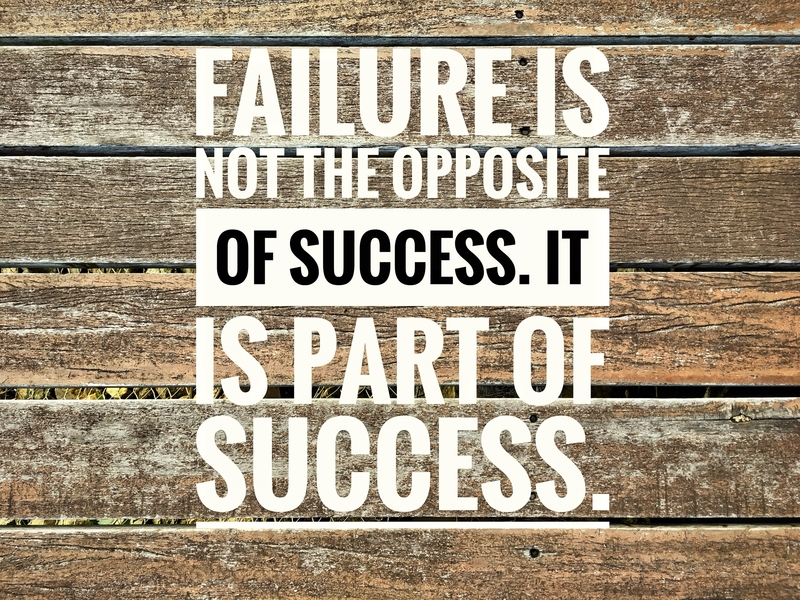We’re taught from early on that success is everything. Win the game or ace the test and you get the grown-up’s approval. Then we get older and succeeding becomes even more important. You got into a hot shot college? Congrats! You won the contract? Great! You built a multi-million dollar business? Super!

But here’s what nobody tells you – before you can win you’ve almost always got to lose, and lose big, and lose often. You’ve heard the expression, “Nothing ventured, nothing gained,” right? Well, when you venture you don’t always gain. Many times you lose, and you lose big.
And when that happens, your confidence takes a nosedive. The next time out you hedge your bets, you pull your punches and you don’t try as hard. Why? Because that way if you fail again, you can tell yourself that you didn’t lose as big. It’s funny, but it’s also human nature.
People fail a time or two and then what do they do? Sadly, many quit. They just give up. Failure hurts too much. It’s humiliating and embarrassing and they’d rather play it “safe.” Which actually means they don’t want to play at all, they just want to sit in their cozy cotton lined box and never venture outside into the cruel world again.
Here’s what those people don’t know: The ONLY way to truly, absolutely, permanently fail is to quit. Everything else is simply a step on the way to success.
Did you know…
– The average millionaire goes bankrupt 3.5 times.
– There is a new millionaire created every 58 hours.
– The average millionaire doesn’t realize their dream until age 45 and becomes a millionaire at 54.
– The average millionaire dabbles in 17 different businesses, concepts, schemes and enterprises but doesn’t hit it big until the 18th try.
Entrepreneurship is the quickest way to become a millionaire. 74% of all millionaires in America became millionaires through entrepreneurship.
The average millionaire goes bankrupt and what does s/he do? Dusts themselves off and tries again. And again. And again. Failure is a temporary detour, not a roadblock. I absolutely promise you, if you’re still breathing then you can still succeed and succeed BIG, regardless of how many times you’ve failed in the past.
Remember those Chicken Soup for the Soul guys, Jack Canfield and Mark Victor Hansen? Their manuscript got rejected 140 times by 140 different publishers. Most people would have quit after the 10th or 20th rejection, but they just kept sending out that manuscript until the 141st publisher took a chance. Result? Both of them are millionaires many times over.
Winston Churchill failed the sixth grade and he was defeated in every public office role he ran for. Then he became the British Prime Minister at the age of 62 and led his country to victory in WWII.
Success consists of going from failure to failure without loss of enthusiasm. – Winston Churchill
R. H. Macy had a long and undistinguished history of failing businesses, including the first Macy’s in NYC. No one would have bet on him, but he went on to create the biggest department store in the world.
Marilyn Monroe’s first contract with Columbia Pictures expired because they decided she wasn’t pretty or talented enough to be an actress. But Monroe kept plugging away, and even today’s audiences know and love her decades after her untimely death.
Toyota passed over Soichiro Honda for an engineering job. He could have quit on his dreams. Instead, he went on to make motorcycles and cars and became a billionaire in the process.
Thomas Edison’s teachers told him he was “too stupid to learn anything.” Imagine how that could impact a child, hearing from the ‘experts’ that you’re too stupid to learn. Most kids would stop trying. Not Edison.
Our greatest weakness lies in giving up. The most certain way to succeed is always to try just one more time. – Thomas Edison
Vera Wang failed to make the U.S. Olympic figure-skating team. Then she got passed over for the editor-in-chief position at Vogue. Time to realize she was a failure, right? Wrong. At age 40 she began designing wedding gowns and today she’s one of the hottest designers in the business and a self-made billionaire.
You’ve probably heard that Walt Disney was fired by a newspaper editor because he “lacked imagination and had no good ideas.” But did you know that he had several failed businesses before the premiere of Snow White?
The difference in winning and losing is most often…not quitting. – Walt Disney
Albert Einstein’s teachers labeled him “slow” and “mentally handicapped.” What if Einstein had actually believed the people who made these proclamations? For one thing he never would have won the Nobel prize in physics.
Henry Ford’s first auto company went out of business. He abandoned a second because of a fight and lost a third to declining sales. Yet he went on to become one of the greatest American entrepreneurs ever.
If you think you can do a thing or think you can’t do a thing, you’re right. – Henry Ford
J. K. Rowling was unemployed and living on social security while writing her first Harry Potter novel. It was rejected by 12 different publishers and finally picked up with a paltry advance of just 1,500 pounds, but now she became the first person to become a billionaire through writing.
For every failure to success example I’ve given here, there are literally hundreds of thousands of others out there. And the only thing stopping you from becoming the next failure to success story is you. So what are you waiting for?
Hurry up and get your failures out of the way so you can go on to create big success for yourself too. And maybe someday your story will be featured right along with Einstein’s, Ford’s, Disney’s and all the other great people who refused to let a little thing like failure get in their way.











